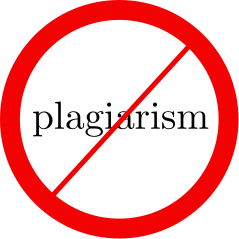Fighting plagiarism and intellectual dishonesty with proper citations

Hi Steemians! Lately I have been reading up on a lot of scientific posts with the steemstem-tag. I noticed that there is a lot of plagiarised content. There are also many posts which fail to clearly indicate that their methodology/examples are taken from scientific literature. Although the latter case is not as unethical as the first, the latter post type does give the appearance that the presented methodology/examples are original work which is false. In this post I will explain why citations are important and how you can improve your citations and help others.
Why citations are required
So how can the scientific community on steemit deal with these problems? Just use the same method that the scientific community uses: when facts are presented give proof/evidence or citations. More specifically, if an article is portrayed as scientific then for any fact a proof/evidence should be supplied or a citation should be given. For the steemit community it is not very important to know how to properly present proof/evidence for fact since most of the scientific content on steemit is derived from scientific literature. Thus I will restrict this post to citations. The main reasons for citations is that they uphold intellectual honesty, in the sense that the right sources are given credit, but it also counters plagiarism since most scientific content is identifiable by their reference list.

How to do proper citations
Many posts have a reference list at the end. From a scientific point of view this by itself is not very helpful. Since a scientist always wants to check the validity of any statement. A reference list does not couple a statement to a reference. So in scientific articles when a fact is presented a citation is directly given. Typically this is done as follows:
A is true [1].
References
[1] A. Man, why A is true, Journal of A 10, 19-20 (2018)
It usually differs a bit how specific scientific communities write their references. In [1] I adopted the mathematics style referencing. But this is not so relevant. What is important is that when giving a reference is that you are as precise as possible in giving the location where the fact can be found. In doing so individuals can check your work. Exact location means in the case of a book/journal that you present page numbers. In the case of long web-content it is advisable to present the relevant section. Of course, if you are you presenting a re-telling of an example or methodology from the scientific literature you should also give a reference. Preferably you should do this at the start of your re-telling.
When are citations not required
There is one part of all science which does not require a reference which is when you are dealing with terminology. For example, if I would present you the definition of the derivative then I am not required to give you a reference where the definition of the derivative can be found. Similarly, if in physics I would be talking about momentum then I can just define it without giving a reference. The only exception here is when a certain terminology has recently been introduced then you should credit its creator by presenting the reference.
There is another part where citations are not required which is when certain knowledge is considered trivial or basic. This is a slighly grey area since trivial/basic is dependent on the situation. For example, if you write an article for experts then you do not have to explain the basics and you do not have to present any reference when using basic facts. But if you are writing for a general audience it might be a good idea to present a reference for these basic facts or at least clearly indicate that they belong to realm of basic knowledge.
How can scientific content on steemit improve
All scientific authors on steemit should do citations conform to the standards of the scientific world. But besides that we, the readers, should also point out to authors when proper citations are missing or when a post is not intellectually honest. For sake of transparency this should be done in the comment section since if the author does not make the correct adjustments this will affect his/her reputation. And consequently, it will also influence the value of his/her post. By doing this, you are rewarding scientific integrity and improving the quality of the scientific content on steemit.
Sources
Pictures made using inkscape. It is free!

I searched for an appropriate thread to ask you something else, but then I found this thread and it reminded me to show you this:
https://steemit.com/@multinet
What do you think?
Is he legit or a plagiarizer?
You got a 22.22% upvote from @ubot courtesy of @stimialiti! Send 0.05 Steem or SBD to @ubot for an upvote with link of post in memo.
Every post gets Resteemed (follow us to get your post more exposure)!
98% of earnings paid daily to delegators! Go to www.ubot.ws for details.
Citations are indeed important. Whenever I read something that is presented scientifically without any references; it seems opinionated. Writing about an opinion is not as valuable - I will not trust that information. There are several ways to cite, footnotes being one of them. Adding hyper-links and in-text citation is fairly simple too (I'm more used to the APA style of referencing). Although a reference list is not necessary in the end (if you cite in-text), it helps reader both to find the resources without scrolling up, and it does give the article a much more scientific feel.
I don't know if I speak for all of steemstem but for myself, if a post is talking about a specific instance of something, I would prefer if it didn't reference general stuff.
What I mean here is if they were writing on a specific protein and have a brief explanation of how proteins are coded, I wouldn't care if they had a source for DNA, RNA, amino acids and like all of the general more common knowledge expected that may be present as, with blogs, we are not as strict as actual scientific papers. Though it won't hurt a blog to be more thorough (it can hurt it if it isn't thorough enough)
Especially when comparing to some of the professional science blogs (IFLS, phys.org, etc) where they may have one or two references for a post and have the post contain tons of things not present in the source (that is if they even cite sources, there are a few blogs by IFLS that don't even do that)
However, in spite of everything I stated in this comment, I agree with you. Sourcing stuff/info is extremely important.
Yes I agree that with certain fundamental concepts you can be lenient with referencing. But I do think that if you get to the main theme/material of your post you should use proper referencing.
If I am writing a paper for a specialist audience then of course I don't have to give citations for knowledge that is considered completely standard. But I think that most of the work on Steemit is aimed at a more general audience so even certain basic things could use some citation.
I will adapt the post a bit based on your comment.
Something interesting to ponder is the content presented in the recent post by @justtryme90 about the actual audience reached by science blogs versus the intended audience. I mean yes I do completely agree that good referencing is, to some extent, required (and proper referencing makes a blog go from being like a 6 in sexiness to a 9 so fast, if that makes sense)
Thanks. I will check that post out :o)
I don't think that you will really notice much of referencing if it is done properly. Whenever a fact is presented you just put a number in square brackets. I am not sure if that harms the sexiness of a post.
What I think is most harmful for sexiness is when you present all the details behind a result. But for most fields you can write a result driven sexy post without details.
No the numbers in square brackets don't take away from sexiness, what does though is when someone has a link that goes nowhere and so it would just reload the page if clicked. Just my opinion though on that one!
Yeah. I agree :o)
I completely agree. Proper citation is absolutely critical to high quality scientific posts. You need to be sure (or at least be able to check) that what you are reading is actually correct, or at least regarded as correct by the scientific community.
Especially in the internet mere speculation or sometimes even flat out wrong statements are often sold as concrete truths. So citations are essential if you want to be taken seriously.
Also disclaimer: Yes, it is sometimes hard to find proper sources and yes, I too am guilty of taking the easy road to Wikipedia sometimes but I only use Wikipedia for elementary stuff and try to find better sources where I can.
Many of us are guilty of wiki-crimes :P
What about stuff that you've learned/researched yourself? For example, most things I want to/will write about in the future are things that I have discovered when doing projects in university. How would you cite that? We didn't research spherical video production in scientific papers for example, we had cameras and experimented with different shots and post-production techniques to see what works and what doesn't.
I guess in your case everything is encoded in the result, the spherical video. So I guess it acts as evidence/proof of your scientific act. From the perspective of intellectual honesty you would still be required to mention where you learned this skill. This in some sense acts as a reference.
I once did APA 6th for a post here on adult higher education, like this (Stone, Water, & House, 2018) (in-text only, the citations are cos they are clickable links) but for any casual posts I need a citation, I just do something like Source.
Common practice to give respect for original authors.
For casual posts that is absolutely fine. But I think that for scientific posts there should be more rigour.
This is a very important post.
hmm... The more I need to be extra careful though mind are just the basic.